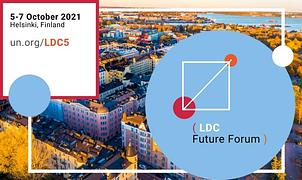
With support from the Government of Finland, the Forum was organised by the United Nations Office of the High Representative for the Least Developed Countries, Landlocked Developing Countries and Small Island Developing States (UN-OHRLLS) in collaboration with the United Nations University World Institute for Development Economics Research (UNU-WIDER) and the Sustainable Development Solutions Network (SDSN).
The Forum contributed to the Fifth United Nations Conference on LDCs (LDC5), taking place in Doha in January 2022. It will address the structural challenges and emerging issues faced by LDCs.
Participants debated and introduced policy recommendations that can support LDCs in achieving the SDGs, build their ability to compete in the global economy, and eventually move towards convergence with other more developed economies.
During the LDC Future Forum, authors, selected through a competitive process, presented their research findings on issues affecting LDCs. Several world-renowned academics as well as high level representatives from LDCs and their development partners also participated in the conference.
The LDC Future Forum will take place in person in Helsinki, Finland and online. Participate : https://www.un.org/ldc5/ldc-future-forum-participate
For many years, FERDI's work focuses on the LDC category rationale and the efficiency of the LDC-specific International Support Measures, in particular as part of the Sustainable Development Goals (SDGs).
The foundation contributes to analyse the conditions and prospects of the LDCs graduation. It is a member of the LDCIV Monitor, which is monitoring the programme adopted in Istanbul in 2011 (Istanbul Programme of Action) and whose work ends this year.
In this context, FERDI has published several books and participated in the LDCIV Monitor progress reports and in several UNHORLLS conferences, including the preparatory conferences to the Fifth United Nations Conference on LDCs (LDC5), organised in collaboration with UN-OHRLLS: "Recovery from COVID-19: Tackling vulnerabilities and leveraging scarce resources" onOctober 21-23, 2020, and "How can development finance address the vulnerability challenge in LDCs and other vulnerable countries? Improving allocation and supporting structural transformation" onApril 12, 2021. The videos of the conferences are available in the links below.
Patrick Guillaumont, President of Ferdi, and editor of the books Caught in a Trap, Identifying the least developed countries and Out of the trap: Supporting the least developed countries respectively published in 2009 and 2019 offered a first global assessment of five decades of measures aimed at helping LDCs "get out of the trap".
He was invited to the conference for an introductory session on the history of the LDC category rationale over half a century. He opened the discussion on the current validity of this logic.
------------
Moderator: Ms. Heidi Schroderus-Fox, Director, UN-OHRLLS
Speakers:
Alassane Drabo, former Ferdi Research Officer, introduced the main findings of his research paper LDCs graduation and structural transformation: Are improvements in LDC's structural handicaps a step towards structural transformation?
---
Moderator: Mr. Brahima Sangafowa Coulibaly, Vice President and Director of Global Economy and Development, Brookings Institution
Panellists:
Jaime de Melo, Scientific Advisor at FERDI introduced the main findings of his research paper Implementing the Trade Facilitation Agreement (TFA): estimates of reduction in time at customs for the United Nations’ vulnerable economies.
--------------
Moderator: Mr. Ratnakar Adhikari, Executive Director, Enhanced Integrated Framework (EIF) (virtual participation)
Panellists: